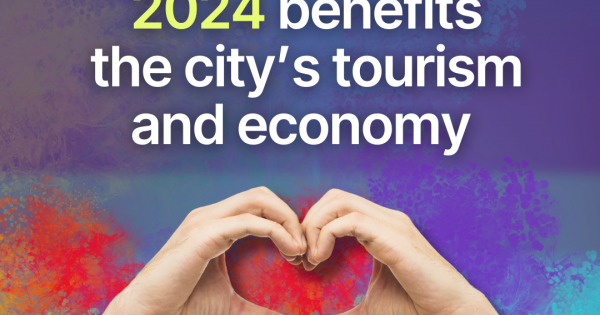FLORENCE – During the European LGBTQ+ Tourism Summit held in Brussels recently, The Data Appeal Company, part of the Almawave Group, analyzed the impact of Brussels Pride on local tourism using the company’s proprietary LGBTQ+ Index. This analysis, timed ahead of global Pride Month in June, highlights the significant economic benefits that pride events around the world can instill in the LGBTQ+ community.
The Brussels Prideevent typically takes place before the June Pride month world wide and this year took place on May 18 and attracted an estimated 250,000 attendees, significantly boosting the local economy. The economic impact of the event was substantial, with nearly 20 million dollars generated through various spending categories. Restaurants and bars benefited the most, accounting for 66% of the total spending, followed by transportation at 22%. Interestingly, only 12% of the spending is related to accommodation, indicating that the majority of attendees were day visitors who traveled to the capital specifically for the Pride festivities.
Excellent connectivity of Brussels to nearby major cities such as Paris, Amsterdam, and Cologne facilitated this influx of visitors. The city’s accessibility by train and other forms of transportation made it convenient for people from surrounding regions to join the celebration. The tourism trends during Pride Week were positive, with hotel rates peaking at 213 euros per night on May 18 and a saturation rate of 50%.
Speaking to the audience at the European LGBTQ+ Tourism Summit, Damiano Meola from The Data Appeal Company explained that Brussels achieved an impressive LGBTQ+ Index score of 77 out of 100, ten points higher than the national average of 67 out of 100. This high score reflects the city’s strong level of inclusivity, as perceived by both residents and visitors. The Data Appeal analysis also highlighted Ghent as the top city for inclusivity in Belgium, with a remarkable score of 88 out of 100. This achievement can be attributed to Ghent’s large, diverse student population and progressive municipal policies that foster an open and welcoming environment.
The Data Appeal Company’s LGBTQ+ Index is a comprehensive tool for evaluating a destination’s inclusivity towards LGBTQ+ individuals. Leveraging AI and semantic analysis, the index assesses online content, comments, and reviews to provide insights into a territory or company’s LGBTQ+ friendliness perception.
Within Brussels, certain neighborhoods stood out for their exceptional inclusivity scores. Ixelles, Uccle, and the European District were identified as the most inclusive areas, driven by their vibrant, international, and student-centric communities. These neighborhoods exemplify how diversity and inclusivity can enhance the social fabric of a city, making it more attractive to LGBTQ+ travelers.
Adding to this Meola, who is Marketing Director at The Data Appeal Company, emphasized the broader significance of these findings: “Ahead of Pride Month in June, our analysis of the recently held Brussels Pride event – on of the first of the season – shows not only the fantastic visibility and pride it brings to the LGBTQ+ community but also its very important economic impact. Events like these underscore the value of inclusivity in tourism and the positive effects it has on local economies. Belgium’s commitment to LGBTQ+ rights and inclusivity continues to make it an appealing destination for travelers. The success of Brussels Pride highlights the broader benefits of fostering an open and welcoming environment for all visitors.”
The article Successful Brussels Pride demonstrates the power of inclusivity in destination tourism first appeared in TravelDailyNews International.
